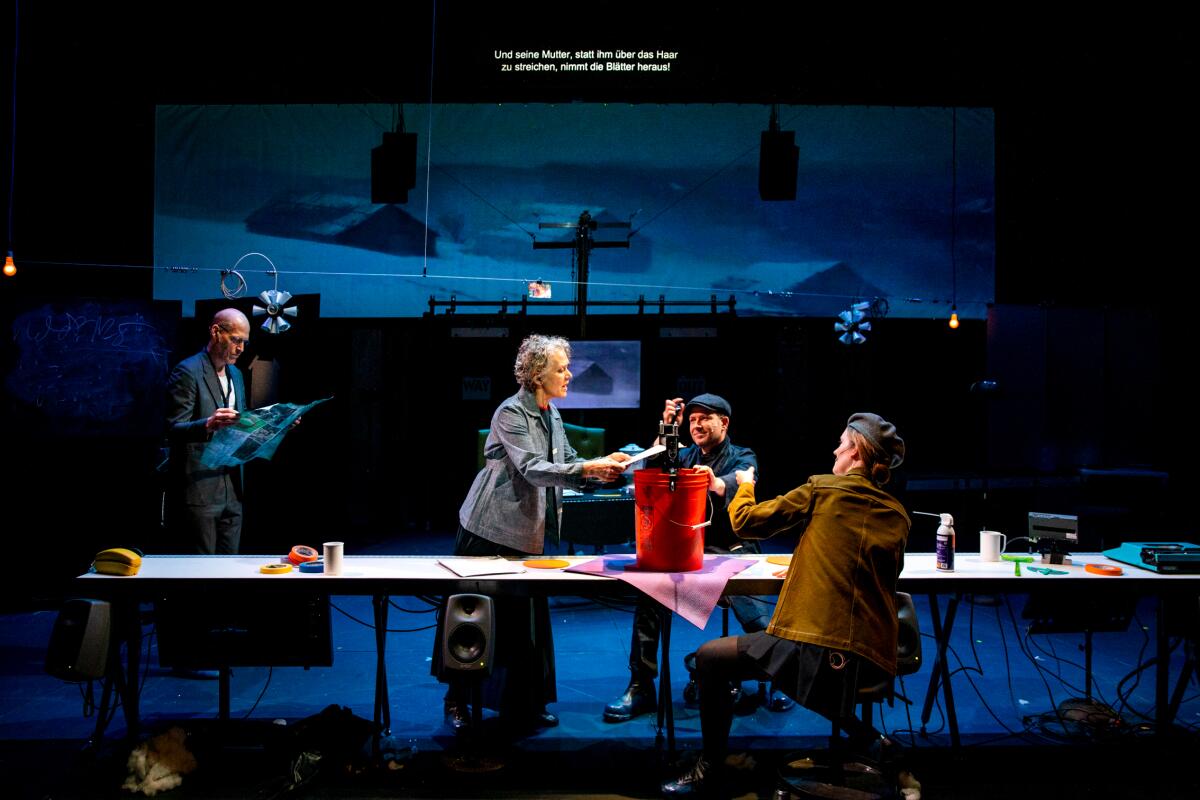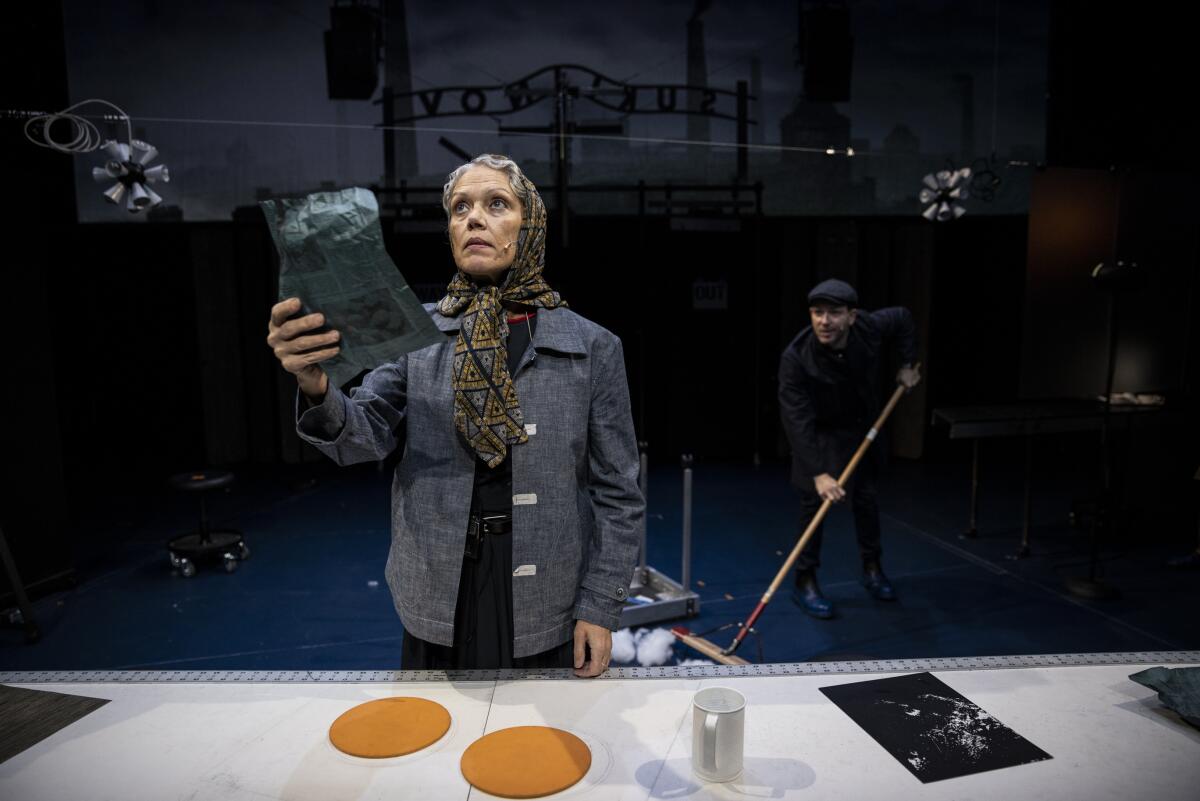Review: In Wooster Group’s staging of Brecht’s ‘The Mother,’ techno postmodernism turns political

- Share via
The Wooster Group and Bertolt Brecht might seem like strange bedfellows, but the New York experimental troupe’s staging of “The Mother,” one of Brecht’s “learning plays,” left me wondering what took the company so long.
Aesthetic differences shouldn’t be painted over, but there’s a surprising degree of compatibility in their innovative theatrical methodologies. At REDCAT, where the Wooster Group returned Wednesday for a five-day run of “The Mother,” techno postmodernism finds its political heart.
Brecht’s epic theater was born in opposition to the traditional Aristotelian formula. The goal wasn’t to hypnotize an audience through an emotional narrative. Rather, the mission was to wake spectators up to the reality that their society is a construction every bit as contrived and changeable as the performance they’re currently watching.
Instead of catharsis, Brecht aimed for critical consciousness. To achieve this end, he elaborated a series of distancing tactics, or alienation effects, that were designed to disrupt the spell of the performance and expose the machinery behind theatrical illusion.
The Wooster Group has been alienating audiences in its own avant-gardist way for decades. The company’s multimedia collages, often blending canonical treasures with campy bric-a-brac, have worked to undo entrenched assumptions of theatrical perception. The stage is defamiliarized so that audiences can refamiliarize themselves with possibilities long obscured by convention and habit.
In turning in recent years to key theatrical figures of the 20th century — Tennessee Williams, Tadeusz Kantor, Harold Pinter — the Wooster Group has sought rejuvenation for itself and new life for the artist or artwork under investigation. The group’s homage to the Polish artistic visionary Kantor, “A Pink Chair (In Place of a Fake Antique),” seemed a natural symbiosis of sensibilities. “Vieux Carré,” Williams’ somewhat louche 1977 memory play often unfairly consigned to the detention table with the playwright’s other disobedient late works, thrived in the Wooster Group’s weirdo company.

I feared that “The Mother” might repeat the mistake of “The Room,” the troupe’s staging of Pinter’s early one-act that only exposed an unbridgeable gulf in poetics. But Brecht’s play turns out to be both theoretically and practically amenable to Wooster Group director Elizabeth LeCompte and her veteran company, led by Kate Valk in the title role.
Distilled from Maxim Gorky’s 1906 novel of the same name, “The Mother” arose out of the economic turmoil of the early 1930s and sought to instruct its audience in the morality of class struggle. The cause Brecht is explicitly championing is worker solidarity. Marxism informs the play’s didactic thrust. But this is no high-flown intellectual teach-in. The approach is unpretentiously human.
Short scenes are punctuated with songs. The fourth wall is shattered to remove the division between actors and audience. The work isn’t participatory, but the feeling is that we’re all in this mess together and that sustained collective action is the only answer.
Valk plays Pelagea Vlasov, a middle-aged Russian widow who lives with her son, Pavel (Scott Shepherd), a factory worker whose wages keep getting cut. Not even frugal Pelagea can make the watery soup stretch long enough. They’re behind on their rent, and factory management doesn’t seem to care whether its employees and their families go hungry.
Distrustful of political action when the play begins, the illiterate Pelagea becomes an accidental activist after volunteering to distribute leaflets calling for a strike. Her motive is to protect her son, who has begun fraternizing with revolutionary workers (played by Ari Fliakos and Erin Mullin). She fears for his safety, but the more state brutality she encounters, the more committed she becomes to toppling the existing system.
After her son is imprisoned for his role in a demonstration, she is reluctantly taken in by Teacher (Jim Fletcher), who provides safe harbor under the condition that she keep her trouble-making politics out of his apartment. Before long, he’s teaching her and her friends how to read and writing pamphlets to aid in their class war.

“The Mother” makes a more direct emotional appeal than Brecht’s more complex dramatic works, such as “Mother Courage and Her Children,” written several years later for a more traditional theater audience. I couldn’t help craving a touch more emotive power from the Wooster Group, which interrupts the political sentiment with its usual ironic antics.
The use of microphones, recorded voice and episodes of lip-syncing doesn’t allow us to mindlessly settle into the story. This added layer of opacity might understandably provoke frustration in the uninitiated. (The Wooster Group isn’t for reluctant beginners.)
But the play’s meaning comes through in the steady, determined gaze of Valk’s Pelagea, who unsentimentally arrives at the understanding that a world without economic justice is itself a prison.
Once fearful of running into trouble with the law, Pelagea is now the first to take up the workers’ flag. A magnificent line from the play, not included in the Wooster Group adaptation, is silently communicated by the shifting consciousness of Valk’s character: “Do not fear death so much, fear an inadequate life.”
Amir ElSaffar has composed new music, an atonal jazz that Shepherd bangs out on keyboard when Pavel transitions into talky song. As occasional narrator and commentator, Fletcher ensures the production’s gears shift smoothly.
The cultural stew includes the influence of 1930s Hollywood gangster movies, most notably in the mannerisms and vocal inflections of Fliakos. But Brecht, postmodernized, comes through. “The Mother” still speaks with urgent clarity about a struggle that, as Pelagea illustrates, you’re never too old or insignificant to join.
'The Mother'
Where: REDCAT, 631 W. 2nd St., downtown Los Angeles
When: 8:30 p.m. Thursday-Saturday, 3 p.m. Sunday (all performances sold out)
Tickets: $50
Info: www.redcat.org/events/2023/the-wooster-group
Running time: about 80 minutes, no intermission
More to Read
The biggest entertainment stories
Get our big stories about Hollywood, film, television, music, arts, culture and more right in your inbox as soon as they publish.
You may occasionally receive promotional content from the Los Angeles Times.











